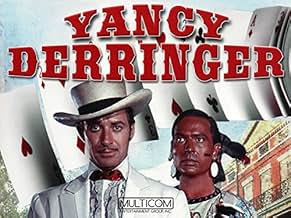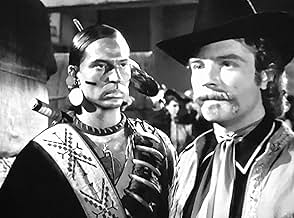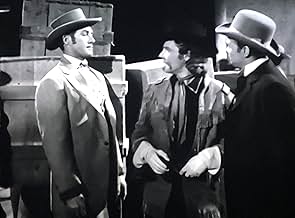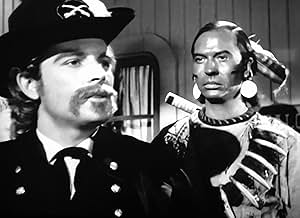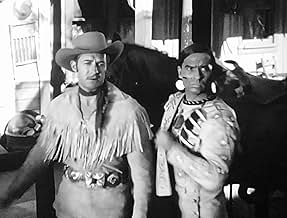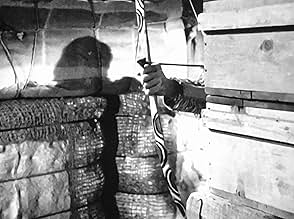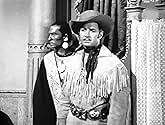An adventurer, gambler, and widely respected southern gentleman is recruited to work as a secret agent, at no pay, in post-Civil War New Orleans, helped by his companion, a silent Pawnee Nat... Read allAn adventurer, gambler, and widely respected southern gentleman is recruited to work as a secret agent, at no pay, in post-Civil War New Orleans, helped by his companion, a silent Pawnee Native American.An adventurer, gambler, and widely respected southern gentleman is recruited to work as a secret agent, at no pay, in post-Civil War New Orleans, helped by his companion, a silent Pawnee Native American.
Browse episodes
Featured reviews
. . . they speak of Yancey D."
So went the theme song to this undeservedly short-lived series. Nominally billed as a "western" (Yancey did, after all, wear a broad-brimmed hat, there were horses about, and his best friend was an Indian), this show was hard to categorize, even in the era of the so-called "adult western."
There was always the hint of a dark side to Yancey, all things considered; a feeling that tucked away behind his reserved manner lay a past that may not always have been too cool (or, alternately, as a friend of mine once suggested, perhaps a bit TOO cool). Moreover, unlike most of his contemporary action heroes, Mr. D. didn't always fight fair: forced into a bare-knuckles match against an huge opponent, Yancey took advantage of his knowledge that the guy had spent the previous night guzzling beer, hammering him into collapse with a series of belly punches you could almost feel through the TV screen.
Not the nicest guy in town, in other words. But eminently effective. And thoroughly watchable. A great series.
So went the theme song to this undeservedly short-lived series. Nominally billed as a "western" (Yancey did, after all, wear a broad-brimmed hat, there were horses about, and his best friend was an Indian), this show was hard to categorize, even in the era of the so-called "adult western."
There was always the hint of a dark side to Yancey, all things considered; a feeling that tucked away behind his reserved manner lay a past that may not always have been too cool (or, alternately, as a friend of mine once suggested, perhaps a bit TOO cool). Moreover, unlike most of his contemporary action heroes, Mr. D. didn't always fight fair: forced into a bare-knuckles match against an huge opponent, Yancey took advantage of his knowledge that the guy had spent the previous night guzzling beer, hammering him into collapse with a series of belly punches you could almost feel through the TV screen.
Not the nicest guy in town, in other words. But eminently effective. And thoroughly watchable. A great series.
Yancy Derringer was different from all other westerns on the air during the late '50's in that it was set in New Orleans rather than a dusty old west town. Yancy Derringer, as played by former stuntman Jock Mahoney, did not carry the traditional six shooter, he packed a pistol in his hat. Yancy Derringer was a dapper, smooth, suave gambler who, along with his Pawnee Indian companion Pahoo, assisted Commissioner John Colton in keeping the peace in a wide-open city.
Yancy Derringer had a different "feel" to it as compared to the other westerns on the air during the later '50's and was a very welcome change during its too short one season run on CBS.
Yancy Derringer had a different "feel" to it as compared to the other westerns on the air during the later '50's and was a very welcome change during its too short one season run on CBS.
This was another good western back in the '50s which gives me fond memories. I remember how me and my pals thought this hero was "cool," something like Richard Boone was in "Have Gun, Will Travel."
The main differences in this western as opposed to most was that the title character
packed a little derringer in his hat, and the setting was New Orleans instead of the old west. Otherwise, he was, like Boone's "Paladin" a smooth, dapper and cool customer.
Jock Mahoney ("Yancy Derringer") was the rugged, silent type, if I remember correctly. The shows were very interesting and we looked forward to them each week. Why this show only lasted on year is a real mystery to me. I don't remember anyone who didn't enjoy it. The mid-to-late '50s was a fabulous era for westerns on TV. If this ever came out on DVD, I would buy it immediately.
The main differences in this western as opposed to most was that the title character
packed a little derringer in his hat, and the setting was New Orleans instead of the old west. Otherwise, he was, like Boone's "Paladin" a smooth, dapper and cool customer.
Jock Mahoney ("Yancy Derringer") was the rugged, silent type, if I remember correctly. The shows were very interesting and we looked forward to them each week. Why this show only lasted on year is a real mystery to me. I don't remember anyone who didn't enjoy it. The mid-to-late '50s was a fabulous era for westerns on TV. If this ever came out on DVD, I would buy it immediately.
When I watched Yancy Derringer as a 6 year old, the guns were especially fascinating. Pahoo-Ka-Ta-Wah had a big shotgun, maybe 10 gauge. Yancy had several tiny guns that were hidden in his clothes. One in his hat, one in his boot. He could be searched, but still pull a derringer out of his sleeve. X Brands, as Pahoo-Ka-Ta-Wah, had the biggest shotgun I have every seen. As I recall, it had a single barrel with a mighty power. If needed, Pahoo-Ka-Ta-Wah could blast the bad guys with such force, smoke, kick, and noise, that it was the grand finale to any fight!
The derringers came in a variety of arrangements, with most of them having two barrels. But some may have had more than two. The smallest derringer had only one barrel. There was a trick derringer, if my memory as a boy serves me correctly. One trick derringer was up Yancy's sleeve on a spring-loaded mechanism. It had scissor shaped metal supports that would expand to full length on command of a gesture. The contraption would spring out of his sleeve into Yancy's hand into the right firing position. The gesture that triggered the spring to release was for Yancy to press his elbow against his side. One derringer was hidden in his belt buckle. Toy stores sold belts with hidden derringers after that show!
Pahoo-Ka-Ta-Wah would carry his shotgun with him wherever he went, but with poise and dignity which seemed non-threatening. X Brands' dispassionate face would seldom display any emotion. He spoke slowly and deeply, with somber meaning that always was important. Pahoo-Ka-Ta-Wah was tall and strong. In a fight, I only remember his 8 gauge shotgun: as the ultimate weapon in any New Orleans brawl. It could knock down a wall!
The derringers came in a variety of arrangements, with most of them having two barrels. But some may have had more than two. The smallest derringer had only one barrel. There was a trick derringer, if my memory as a boy serves me correctly. One trick derringer was up Yancy's sleeve on a spring-loaded mechanism. It had scissor shaped metal supports that would expand to full length on command of a gesture. The contraption would spring out of his sleeve into Yancy's hand into the right firing position. The gesture that triggered the spring to release was for Yancy to press his elbow against his side. One derringer was hidden in his belt buckle. Toy stores sold belts with hidden derringers after that show!
Pahoo-Ka-Ta-Wah would carry his shotgun with him wherever he went, but with poise and dignity which seemed non-threatening. X Brands' dispassionate face would seldom display any emotion. He spoke slowly and deeply, with somber meaning that always was important. Pahoo-Ka-Ta-Wah was tall and strong. In a fight, I only remember his 8 gauge shotgun: as the ultimate weapon in any New Orleans brawl. It could knock down a wall!
Sonmetimes it is hard to understand just why a television series is so short lived.Lack of popularity is the most common reason of course;sometimes the death of a star ends its run prematurely.In the case of Yancy Derringer, it was corporate greed.Originally financed and owned by the writers and Jock Mahoney, it was so successful in its initial season that the network insisted on buying it.Jock Mahoney and the others refused;the network responded by concealing it.End of Yancy Derringer.
The theme song was one of the most distinctive of 1950's television.It outlived its series,and can be frequently heard as b background music on episodes of "The Rifleman" made in the early 1960's.
It is certainly strange that, considering how many fine TV series were made in the first 20 years of TV, so very few are ever shown,except for "I Love Lucy" and a few others.
The theme song was one of the most distinctive of 1950's television.It outlived its series,and can be frequently heard as b background music on episodes of "The Rifleman" made in the early 1960's.
It is certainly strange that, considering how many fine TV series were made in the first 20 years of TV, so very few are ever shown,except for "I Love Lucy" and a few others.
Did you know
- TriviaThe decaying Southern mansion seen on the series was the Tara set from Autant en emporte le vent (1939), which stood on the back lot at Desilu Studios (formerly Selznick International Pictures). The facade was sold and moved to Georgia in 1959.
- ConnectionsFeatured in TV's Western Heroes (1993)
- How many seasons does Yancy Derringer have?Powered by Alexa
Details
- Runtime
- 30m
- Color
- Sound mix
- Aspect ratio
- 1.33 : 1
Contribute to this page
Suggest an edit or add missing content

